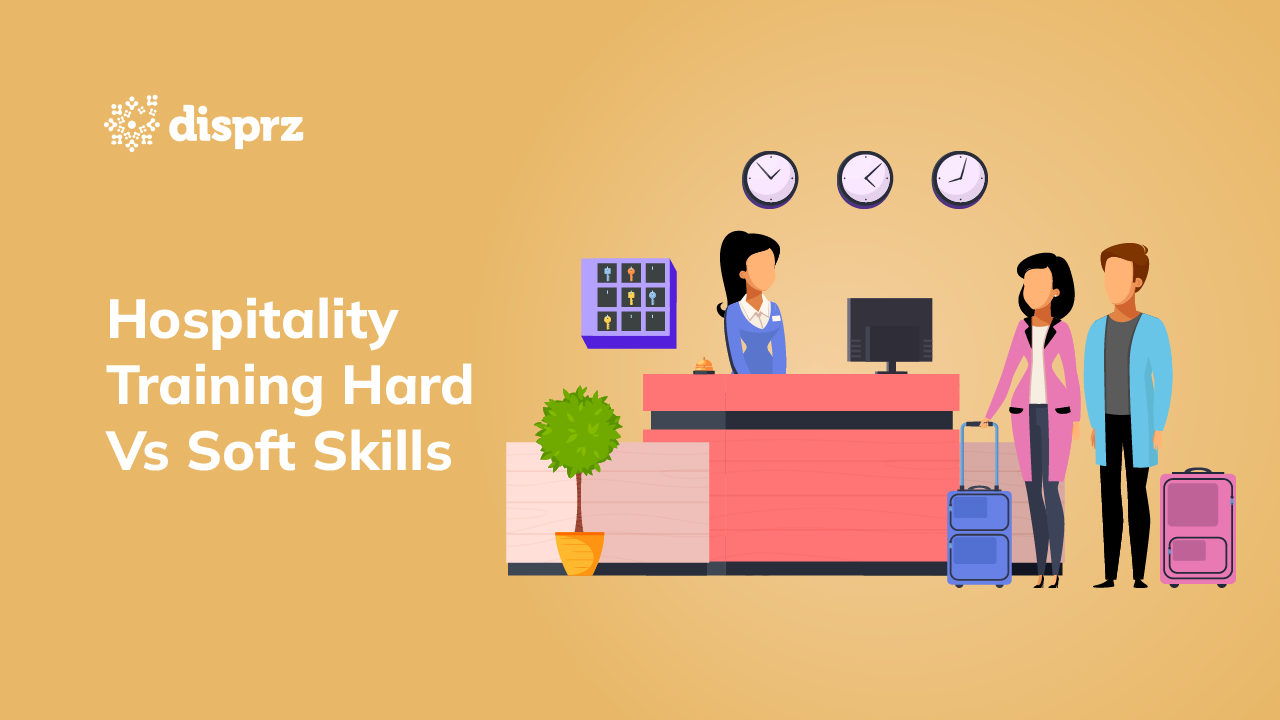According to Punket Research, the global restaurant industry generated approximately $2.2 trillion in 2018. The number of hotels and inns of all types in the world is more than 2 million, housing more than 15 million guest rooms. The revenues from food and bar services garnered $717 billion in the US alone. Honestly speaking, we don’t need these statistics to tell us that the hospitality industry is booming.
Unfortunately, almost 60% of all restaurants fail in their first three years. According to industry experts, the success or failure of such an enterprise is determined by various factors, including – knowledge, drive, skills, determination, and passion. These factors directly relate to employees’ personality, diversity, and most important of all, hospitality training.
This is what we will address in this blog – How we will ensure that the staff members are fully trained and are ready to take your business to its deserved success?
Importance of Soft & Hard Skills for Hospitality Staff
-
In the hospitality industry, both soft and hard skills are essential for success. Soft skills, such as communication and interpersonal abilities, are critical for hospitality staff to create positive guest experiences and foster teamwork. These transferable skills play a key role in enhancing customer satisfaction and cultivating a welcoming environment.
-
Meanwhile, hard skills, like culinary techniques or proficiency with hospitality management software, provide the technical expertise required to perform tasks effectively. The combination of these skills not only boosts job opportunities but also paves the way for a thriving career in the hospitality sector.
Hospitality Training for the Entire Workforce – Front and Back
Skills creation and attitude-building are important for both the frontline and the kitchen staff. The front-end staff need to present their best face to the customer; the back-end kitchen staff need to ensure that the products match the expectation on quality and presentation.
No matter what you have, a restaurant, a diner, or a star-rated hotel, you will need to take a hard look at the hospitality training program you have. How do you do that?
Focus on Hard and Soft Skills
-
Hospitality staff require various skills. The kitchen staff need to know about cooking, hygiene, health & safety, etc. The service staff need to know about table set up, arrangement, cleaning, crowd management, etc. The front office staff need to know about ledger maintenance, hotel management system access, customer relationship management, etc. The admin staff need to know about stocks, procurement, product quality, etc.
-
These are hard skills without which they can’t function at all. There are also some soft skills and behaviors, which would make or break performance. The kitchen staff need time management and stress management. The service staff needs personal relationships and dispute management. You can’t afford to have the most efficient waiter who is short-tempered and foul-mouthed. Or the greatest chef in the world who is disorganized.
-
You need to plan hospitality training interventions and link them up strongly with the performance objectives of the staff members. You should first carry out skills gap analysis, across functional, leadership, and behavioral skills. Say, you have an assistant chef that needs time-management skills. Or you have a waiter that needs stress management training. Or you have a delivery staff that needs a boot!
-
Once you identify the requirements, you can then schedule the training interventions. These days, taking the online route is the best, because no one has the time nor the affordability for face-to-face hospitality training. Even the onboarding training is delivered online, simply because it reduces time to productivity of new hires and saves valuable money otherwise incurred in arranging for the travel of the trainees from geographically dispersed locations.
-
If you can’t build online hospitality training programs yourself, don’t worry. There are pre-built training service providers who can help. Start-ups like Trypsy offer hundreds of microlearning opportunities non various subjects such as compliance, culinary, hotel, service, etc.
-
You can also approach eLearning service providers who can help you source and license training programs by combing through service providers across the world and shortlisting the best and most affordable ones. This is called Strategic Sourcing.
3 Key Hard Skills for Hospitality Workers
Hard skills are essential for hospitality staff, as they vary by role but all require industry-specific expertise to excel. Whether managing reservations or providing food and beverage service, technical proficiency and specialized knowledge are crucial for success in this fast-paced field.
1) Technical Proficiency with Hospitality Systems
In the hospitality sector, employees must be adept at operating industry-specific technology to ensure smooth operations. Point-of-sale (POS) systems allow staff to handle orders, payments, and bookings accurately, while reservation platforms facilitate the management of room or table bookings and guest preferences. Property Management Systems (PMS) streamline guest check-ins, inventory control, and billing processes. Each role demands mastery of these tools to deliver seamless service.
For instance, a front desk agent uses PMS software to assign rooms according to guest preferences, process check-ins, and meet special requests with precision, ensuring a superior guest experience.
2) Expertise in Food and Beverage Service
In roles involving food and beverage service, knowledge of the menu, beverages, and food safety regulations is crucial. Employees must understand menu ingredients and preparation methods to answer guest inquiries effectively. Proficiency in wine and beverage service, including pairing and serving techniques, elevates the dining experience. Adhering to food hygiene standards ensures that all meals and drinks comply with health regulations.
A restaurant server, for example, needs to recommend menu items, suggest wine pairings, and ensure that food is served under strict hygiene conditions, contributing to both guest satisfaction and safety.
3) Revenue Management Skills
Revenue management is a vital hard skill for optimizing pricing strategies and managing inventory in the hospitality industry. By setting competitive and flexible prices based on market trends, seasonality, and competition, professionals aim to increase profitability. Inventory control ensures maximum occupancy and efficient resource allocation. Data analysis helps predict demand and adjust prices accordingly.
For example, a hotel revenue manager evaluates booking data, analyzes competitor pricing, and adjusts rates for peak seasons to boost revenue while ensuring guest satisfaction. This strategic approach to pricing and inventory leads to sustainable financial growth for hospitality businesses.
3 Valuable Soft Skills for Hospitality Employers
Soft skills are crucial in hospitality but can be more challenging to demonstrate than technical skills. Reflecting on past experiences where you applied these skills allows you to share concrete examples during interviews, making your strengths more tangible.
1) Communication Skills
Strong communication is vital in hospitality, where professionals interact with guests, colleagues, and management daily. Effective communication involves listening attentively to guests, understanding their needs, and responding with empathy. Additionally, staff must communicate information clearly, whether offering recommendations or explaining policies, while adjusting their tone and style to suit different individuals.
For example, a front desk agent needs polished communication skills to welcome guests, manage check-in smoothly, and provide clear guidance about local attractions or services to enhance the guest’s stay.
2) Customer Service Orientation
Excelling in hospitality means prioritizing customer service to create positive guest experiences. This involves anticipating needs before they are verbalized, ensuring smooth and enjoyable interactions. Professionals maintain a high level of professionalism, addressing any issues with patience and empathy. Going beyond what is expected to delight guests fosters loyalty and repeat business.
For instance, a restaurant hostess exemplifies this by warmly welcoming diners, accommodating specific seating requests, and overseeing their experience to ensure it runs smoothly from the moment they enter until they leave.
3) Teamwork and Collaboration
Hospitality operations function best when staff work cohesively as a team. Success in this environment requires individuals to collaborate, share tasks, and support one another to meet common goals. Flexibility is key, as professionals may need to adjust their roles depending on the needs of the business. Additionally, resolving conflicts quickly and diplomatically keeps the work environment positive and productive.
A housekeeping team member, for example, works closely with others to ensure rooms are cleaned efficiently, meeting hotel standards and enhancing guest satisfaction by providing timely service.
Follow-up on Hospitality Training
Don’t stop with just delivering the required hospitality training, you need to ensure that it works. This means the training must translate into desired performance. Set timelines to follow up on it. Link these training interventions to performance objectives. If the assistant chef assembles seven burgers in an hour, he should attempt ten an hour. This will help you determine if the training has been effective. That hassled waiter should aim for higher feedback ratings or fewer customer complaints.
If the performance objectives are met, you need to consider taking the training to the next level. If they are not, you need to decide on the next steps: should they undergo the same training again or should there be a new training to be planned? In other words, is the issue with the person or the program?
Embrace the Buddy System for Learning
If you’ve exhausted hospitality training options, or if you can’t afford to spend a lot of money at this moment, you may also consider Buddy System. Assign one efficient waiter to a struggling one. The latter should tail the former and learn by observing, talking, and taking notes about how the former operates.
Similarly, an assistant chef can tail a more experienced and efficient chef to observe and learn.
For those struggling mainly with soft skills, you can introduce mentorship and coaching programs. Bring in either an external professional or, if that’s beyond budget, find an internal mentor. Remember, not everyone can be a mentor. This person should naturally be a leader who the people look up to. The mentor can hold group sessions and one-on-one sessions to identify, address, and help resolve the challenges faced by the group. Such a mentor need not be an industry expert or someone from learning management, but just be good at whatever he or she is doing and someone that others admire for his or her qualities.
The hospitality industry is one of the rarest industries that offers huge business potential and is growing by leaps and bounds. A good restaurant will transform into a great restaurant simply by having a well-trained and motivated staff. Make yours a great one. Look for hospitality training opportunities today and see your business transform.








